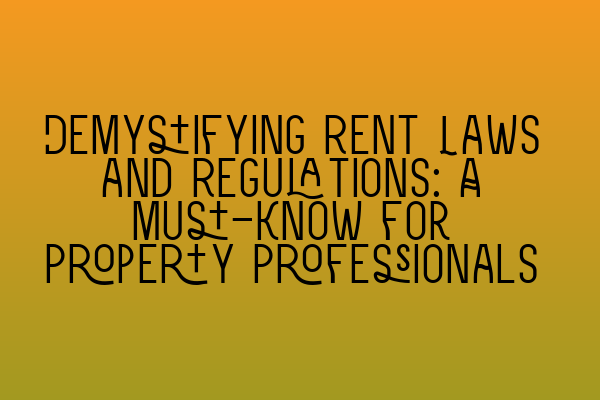Demystifying Rent Laws and Regulations: A Must-Know for Property Professionals
As a property professional, it is crucial to have a deep understanding of rent laws and regulations. Renting is a significant aspect of the property market, and as an expert in property law, it is important to guide clients and ensure they comply with all legal requirements. In this blog post, we will demystify rent laws and regulations, providing you with the essential knowledge needed to navigate this complex area of property law.
The Basics of Rent Laws
When it comes to renting a property, both landlords and tenants need to be aware of their rights and responsibilities. Rent laws vary from jurisdiction to jurisdiction, so it is essential to stay informed about the specific regulations in your area.
One fundamental aspect of rent laws is the establishment of a legally binding tenancy agreement. This agreement outlines the terms and conditions of the rental, including the rent amount, payment schedule, duration of the tenancy, and obligations of both parties. As a property professional, you play a vital role in ensuring all tenancy agreements are fair, transparent, and comply with local laws.
Another crucial aspect of rent laws is the protection of tenants’ rights. These rights include the right to a safe and habitable living environment, the right to privacy, and protection against unfair eviction practices. It is essential to educate your clients, both landlords and tenants, about these rights and ensure they are upheld throughout the tenancy.
Key Rent Regulations
Now that we have covered the basics, let’s delve deeper into some key rent regulations that property professionals should be familiar with:
1. Rent Control Laws
In some jurisdictions, there are rent control laws in place to protect tenants from excessive rent increases. These laws typically limit the percentage by which landlords can increase rent each year. Stay updated on the rent control laws in your area to provide accurate advice to your clients.
Related Article: SQE 1 Practice Exam Questions
2. Security Deposit Regulations
Security deposits are an important aspect of renting a property. These deposits serve as protection for the landlord in case of any damage to the property or unpaid rent. However, there are strict regulations governing security deposits, such as the maximum amount that can be charged and the timeframe within which they must be returned. Make sure your clients understand these regulations to avoid any legal issues.
Related Article: SQE 1 Practice Mocks FLK1 FLK2
3. Rent Arrears and Eviction Procedures
When tenants fail to pay rent, it is essential to follow proper procedures to recover the arrears and potentially evict the tenants. Each jurisdiction has specific rules and processes for handling rent arrears and evictions. As a property professional, you need to be well-versed in these procedures to guide your clients through the process smoothly.
Related Article: SQE 2 Preparation Courses
4. Discrimination Laws
Discrimination in rental properties is strictly prohibited. Landlords cannot deny a rental application based on factors such as race, religion, gender, disability, or familial status. Familiarize yourself with the anti-discrimination laws in your jurisdiction to ensure your clients comply with these regulations.
Related Article: SQE 1 Preparation Courses
Staying Up-to-Date with Rent Laws
Rent laws and regulations are constantly evolving, so it is crucial to stay updated with any changes. A great way to stay informed is by regularly attending relevant seminars, workshops, and conferences related to property law. Additionally, you can subscribe to legal publications and join professional organizations to access the latest industry news and insights.
Final Thoughts
Rent laws and regulations play a vital role in the property industry, and as a property professional, it is your responsibility to have a comprehensive understanding of them. By familiarizing yourself with the basics of rent laws and keeping up-to-date with any changes, you can effectively navigate this complex area of property law and provide valuable guidance to your clients.
Related Article: SRA SQE Exam Dates
